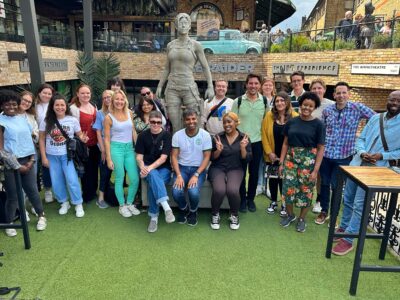This is Co-founder of ThirdLove, YPO member Heidi Zak upon realizing she wasn’t the only woman in the world who didn’t fit into a traditionally sized bra. Soon thereafter, ThirdLove became the first ever bra brand to offer half-cup sizes, challenging the prevailing misnomer that there were only 35 bra sizes in the world and if you didn’t fit into one of them, well, you were out of luck.
Out of touch, out of time
Unlike software or technology, retail hasn’t traditionally been a sector angling for change and particularly in the lingerie department, there has been one, single, dominant industry player for a very long time.
“If you look at an apparel sector like denim or shoes or bags, you can name many players,” says Zak. “But in bras, particularly in the United States, there’s really only been Victoria’s Secret.”
Where others might have viewed this dominator as a detractor, for Zak, it was a clarion call of inspiration. Having worked in both retail and tech (Zak launched and ran the international business side of specialty retailer Aeropostle and had a marketing role at Google before leaving to start ThirdLove) she understood how they played nice together. That, and Zak believed that Victoria’s Secret’s impossibly-thin, airbrushed models wearing angel wings and blowing kisses aesthetic felt like, well, like something designed in 1977 …
Which it was.
And so, in 2013 together with her husband — Co-founder Dave Spector — and some Series Seed love in the form of USD5.6 million, the San Francisco-based ThirdLove was born. The launch was followed by a Series A in 2015 to the tune of USD8 million this time, including heavy-hitter industry investors like former CEO of Spanx Laurie Ann Goldman, and former CEO of Victoria’s Secret stores Lori Greeley.
The three ThirdLoves
Zak points to three mini disruptions that went into creating the very major ThirdLove:
- Fit “When we started out, the phrase we heard most often was, ‘That’s not the way it’s done,’” recalls Zak ruefully. “People said that to us a lot, especially regarding the half sizes — our manufacturing partners told us it was too expensive, too complicated, was going to take too long, has been tried before and hasn’t worked — whenever you try to do something radically different there are always going to be detractors saying you’re crazy.”Today over a third of the company’s business is in half sizes.
- Data “No woman wants to go to a store to buy a bra,” says Zak, “but we do it because we don’t want to order 20 bras online in order to find the one that fits properly. To combat this, we created the fit finder, which is a 60-second online test that determines a customer’s perfect bra shape and size. With 10 million women having taken the test, our compiled data is now used for product development, marketing and future advancements.”
- Marketing “The third thing that differentiates us is creating a product and marketing that speaks to people like the intelligent human beings they are,” says Zak. “While I’m sure there are women out there who really want their bras pushed up and bedazzled with rhinestones, there are just as many (and perhaps more) who want their bras to be beautiful and comfortable and make them feel good.”
Support system
While ThirdLove has iterated faster than a large company with systems and processes in place could have, there is still a palpable sense that speed is of the essence. “Speed is something that should be at the forefront of every CEOs mind because none of us are doing things quickly enough,” says Zak. “I’m not saying to go out and make rash decisions, but people in their YPO forums don’t ever say, ‘Oh, you know, that decision I made, man, I wish I would have waited another six months.’ Every time it’s somebody saying, ‘Wow, I really should have done that sooner.’”
Zak points to setting a timeline and choosing a direction and not looking back as imperative measures for success. But she has also learned that it is impossible to communicate too much; that telling your story over and over again embeds your ethos in every member of the team.
“We talk a lot about our early days and how hard it was; the mistakes we made and what we’ve been through to get where we are today,” says Zak. “I think one of the biggest disservices in the way stories of radical success are told is that they skip the struggle. There were moments when I wondered whether I could continue, when we didn’t have a good customer base and our product was crappy … that’s the journey; without understanding how we got here, it’s impossible to understand what it means to live the company values.”
Mission possible The mission of ThirdLove, to help women feel comfortable and confident in their everyday lives, extends far beyond those who can afford a bra with an average price tag of USD68.
“From the very beginning, we wanted to give back to the community,” says Zak. “Particularly living and working in San Francisco where every day we see the homeless crisis, we wanted to do our part to help.”
Today, ThirdLove, in concert with I Support the Girls, donates bras to homeless shelters and female charities throughout the city, as well as all around the country. In tandem with The Unmentionables, ThirdLove reaches girls and women in refugee camps, globally.
“Our donations to the camps are always changing because the refugee situation is sadly constantly evolving,” says Zak. “The massive amount of product we donate is something very near and dear to my heart as well as everyone on the team.”
Yes. Maybe. Just not tomorrow.
As one recently named to “Fortune’s” 40 Under 40 list and whose company has an annualized revenue exceeding 450 percent for the past two years, Zak has proved that you can always “fit it,” you just might need to consider a third option. Might one of those be a brick and mortar?
“Until I can say we have a bra size for pretty much all women, I won’t move to a different category,” says Zak. “I always return to the reason I started the company, which was to get away with having to go into a store. That being said, I totally understand why retail exists and will continue to exist, so I’ll never say never … I’ll say, ‘not tomorrow.’”



